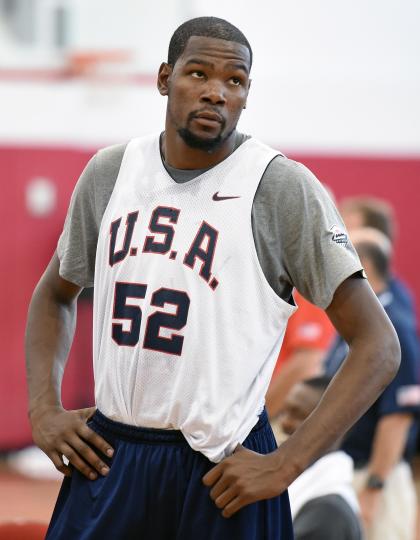Kevin Durant totally dropped out of Team USA because of the Paul George injury
Oklahoma City Thunder superstar Kevin Durant entered the offseason set to lead Team USA to gold in the FIBA World Cup of Basketball. While the team reached that goal, Durant was not part of the journey, having taken himself out of consideration to make the World Cup roster on August 7. Durant cited physical and mental exhaustion as his reasons for pulling out, but the timing struck many as less than coincidental given its proximity to Paul George's now-infamous leg injury in a Team USA exhibition.

It appears that George's injury played a bigger part in Durant's decision than he originally led on. As shown in a new HBO documentary set to premiere on Tuesday, Durant chose not to play in the World Cup because of his own reaction to the George incident. From Michael Lee for The Washington Post:
His family, friends and representatives all understood and supported Durant but the hard part was going to be backing out and disappointing the people – like Krzyzewski – who expected him to play a leadership role in the pursuit of another international gold medal. A few days before he reached out to Krzyzewski, Durant watched Indiana Pacers forward Paul George break his right leg in a horrific collision with a basket stanchion during a Team USA basketball scrimmage in Las Vegas that convinced the reigning NBA MVP to withdraw from the FIBA World Cup.
“It took everything out of me seeing that,” Durant later told friend Randy Williams and a Nike executive at his camp of George. “Everything I had to play for Team USA, that injury stripped it away from me.”
Shortly thereafter, Durant was eating lunch when someone handed him his telephone. “That’s him?” Durant asked.
What followed is probably the most compelling part of the hour-long HBO Sports documentary, “The Offseason: Kevin Durant,” which will air Tuesday at 10 p.m. on HBO. Durant allowed cameras to track the summer following his first MVP season – from Oklahoma City’s season-ending loss to San Antonio in the Western Conference finals to training camp, where the eighth season of his career was delayed by at least one month because of a broken right foot.
The inclusion of this information is somewhat surprising, because Durant has a producer credit on the documentary and presumably could have chosen to cut anything he wanted. The admission that the George injury forced him to reconsider his options paints Durant as a liar at worst and not entirely forthcoming at best. Did the much-liked player simply want to humanize himself?
We can't know exactly why Durant thought it a good idea to put this scene in the documentary, but we can assume that it won't damage his reputation too much. The public tends to give Durant the benefit of the doubt and see his potential missteps as reasonable decisions. For instance, reaction to this revelation could touch on the fact that no one much believed his "exhaustion" explanation at the time and point out the fact that not referencing the George injury allowed USA Basketball to avoid a public relations disaster at a time when the team looked to be lacking star power. Durant can make mistakes like anyone, but when he does so he doesn't receive the same amount of criticism as other top-tier players. People seem more willing to consider his complicated reasoning and see things from his perspective.
It's possible that this special treatment requires a corrective point of view (NSFW language and some interesting ideas at the link) in which we all admit that Durant depends on brand management just as much as more reviled superstars. But it's also useful to wonder why the willingness to see things from Durant's perspective doesn't extend to other players given that they may not be terribly different in the end. It's possible that the proper response isn't to bring Durant back down to the level of everyone else, but to raise others up so that they receive the same type of empathy and consideration.
- - - - - - -
Eric Freeman is a writer for Ball Don't Lie on Yahoo Sports. Have a tip? Email him at efreeman_ysports@yahoo.com or follow him on Twitter!

 Yahoo Sports
Yahoo Sports 

